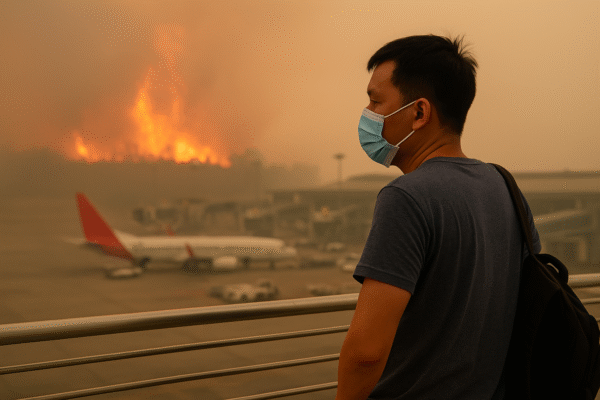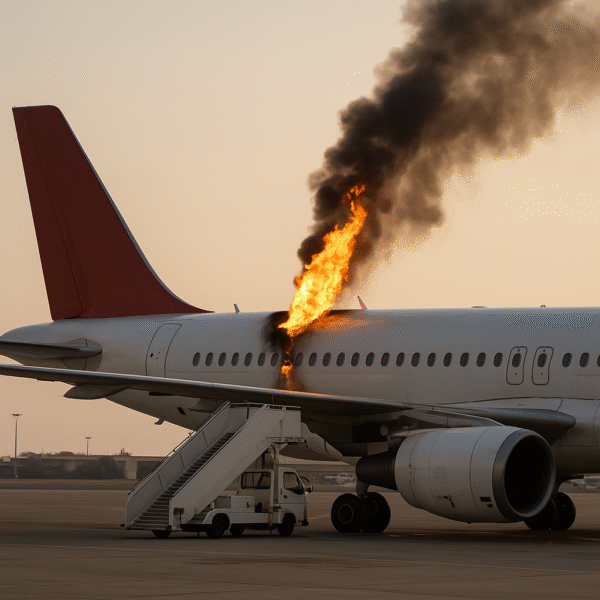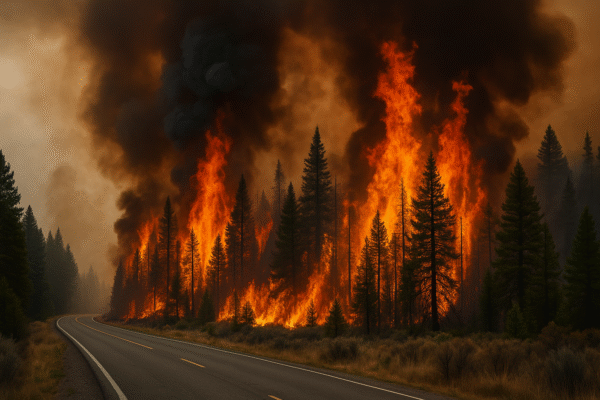Indonesia Joins Global Fight Against Wildfires as Tourism Industry Suffers Devastating Blow
Indonesia has joined the growing list of countries grappling with severe wildfires—alongside the United States, Greece, Turkey, Canada, and Syria—as blazes, intensified by climate change and extreme weather, wreak havoc on communities and the global travel industry. With popular tourist regions like Riau, South Sumatra, and West Sumatra blanketed in smoke and experiencing dangerous air quality levels, the Indonesian tourism sector is facing widespread cancellations and economic losses.
Indonesia: Haze Crisis Hits Regional Tourism Hubs
Indonesia’s wildfire outbreaks have severely impacted destinations known for their natural beauty and eco-tourism offerings. Provinces such as Riau and South Sumatra have seen a dramatic decline in visitor arrivals as thick smoke from peatland fires forces travelers to reconsider their plans. The Indonesian Meteorology, Climatology, and Geophysics Agency (BMKG) attributes the intensifying fires to prolonged drought conditions and the ongoing El Niño phenomenon, which has reduced rainfall and increased the risk of fire outbreaks.
Airports in Pekanbaru and Palembang have reported frequent delays and reduced flight operations due to low visibility, further compounding travel disruptions. The Ministry of Tourism and Creative Economy has issued health advisories and urged operators to provide refunds or rescheduling options to affected travelers.
United States: California and Maui Suffer Massive Economic Losses
In the United States, wildfires in California and Hawaii have triggered evacuations, property loss, and severe disruptions to air travel and hospitality businesses. According to Visit California, the state’s tourism industry lost nearly $5 billion in revenue due to a 20% decline in visitor numbers during the 2024 wildfire season. Although overall tourism spending reached a record $157.3 billion that year, regional losses were acute, particularly in fire-prone areas like Napa Valley and Lake Tahoe.
In Hawaii, the island of Maui—still reeling from the 2023 Lahaina blaze—recorded a 23.4% drop in visitor spending compared to pre-pandemic levels. Recovery is ongoing, with the Hawaii Tourism Authority supporting targeted campaigns to restore traveler confidence.
Greece: Tourism Declines Sharply in Rhodes and Crete
Greece continues to battle wildfires in its southern islands, including Rhodes and Crete, which are major summer destinations for European travelers. In July 2023, more than 20,000 tourists were evacuated from Rhodes as flames approached coastal resorts. Jet2, TUI, and other tour operators suspended services, causing a 76% decline in bookings that week.
In July 2025, Crete faced similar chaos as over 5,000 people were evacuated from Ierapetra due to rapidly spreading fires. These events have dealt a serious blow to the Greek economy, which relies heavily on summer tourism.
Turkey: Summer Tourism Season Cut Short in Coastal Hotspots
Turkey’s fire-prone coastal provinces—including İzmir, Antalya, and Muğla—have seen entire tourism seasons disrupted. Marmaris, a popular resort town, reported an 80% cancellation rate for summer bookings. In Antalya, once on track to welcome 18 million visitors in 2025, numbers now lag behind due to environmental disasters and regional instability.
Air quality warnings, health concerns, and infrastructure damage have forced tour companies to reroute packages and issue refunds. The Ministry of Culture and Tourism is now considering long-term plans to climate-proof key destinations.
Canada: Wildfires Ravage National Parks and Travel Corridors
In Canada, wildfires have devastated parts of British Columbia and Alberta, particularly around Jasper National Park. A July 2024 inferno led to the evacuation of 25,000 people and destroyed 30% of Jasper’s infrastructure, including hotels and tourism lodges. The Insurance Bureau of Canada estimated insured losses at CA$880 million—one of the country’s costliest climate-related disasters.
British Columbia also reported widespread travel disruptions due to hundreds of active fires. The BC Lodging and Campgrounds Association noted a 5% to 15% drop in bookings during peak season, underscoring the need for early-warning systems and sustainable tourism planning.
Syria: Latakia Fires Deepen Crisis in War-Torn Nation
In Syria, the Mediterranean port city of Latakia—once a regional tourist hub—is under siege by wildfires that have destroyed forests, farmland, and cultural landmarks. The fires compound a long-standing humanitarian crisis, with tourism infrastructure already weakened by over a decade of civil conflict.
Latakia’s beaches and ancient Roman sites, typically attracting local and regional travelers, are now inaccessible or severely damaged. The loss of green spaces and coastal attractions has driven tourism activity in the region to historic lows.
The Global Outlook: Urgent Need for Resilient Tourism Infrastructure
The 2024–2025 wildfire season has exposed the vulnerability of the global tourism sector to climate-induced disasters. According to the United Nations World Tourism Organization (UNWTO), climate resilience and sustainable infrastructure investment are now top priorities for recovery. Governments are being urged to adopt fire mitigation strategies, strengthen early-warning systems, and support green tourism initiatives.
International travelers are increasingly considering environmental risk in their destination choices, placing additional pressure on travel advisories, insurance providers, and local tourism boards to prioritize safety and transparency.
As the world warms, wildfires are expected to become more frequent and destructive. For tourism-dependent economies like Indonesia, Greece, and Hawaii, recovery will require not just rebuilding infrastructure but reimagining how destinations can sustainably welcome visitors in the age of climate uncertainty.
For more travel news like this, keep reading Global Travel Wire



















